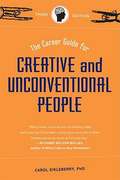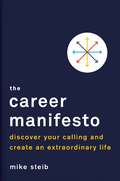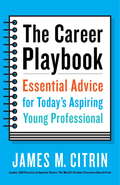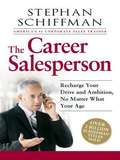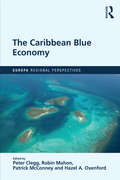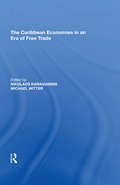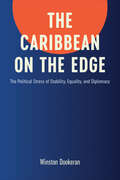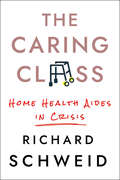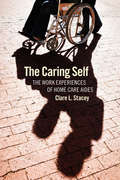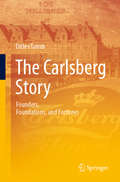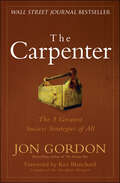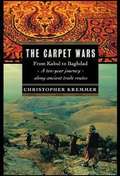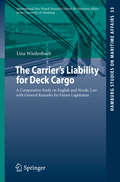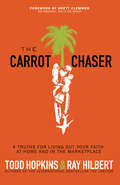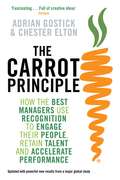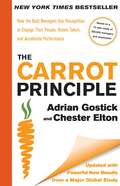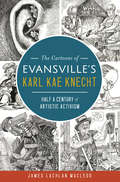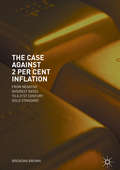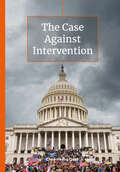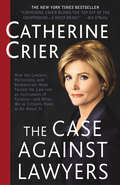- Table View
- List View
The Career Guide for Creative and Unconventional People (Third Edition)
by Carol Eikleberry<p>You don't have to stifle your creative impulses to pay the bills. For anyone who's ever been told, "Don't quit your day job," career counselor Carol Eikleberry is here to say, "Pursue your dreams!" Now in its third edition, her inspiring guide provides knowledgeable career guidance, real-life success stories, and eye-opening self-evaluation tools to help artistic individuals figure out how to remain different, unconventional, and hard-to-categorize while finding work they love. <p>The revised third edition of the popular guide for offbeat individuals seeking work that suits their unique skills, talents, and passions. Updated throughout, including new inspiration and tips for keeping a creative job notebook. Descriptions of more than 270 creative jobs, from the mainstream (architect, Web designer) to the unexpected (crossword-puzzle maker, police sketch artist). Previous editions have sold more than 60,000 copies.</p>
The Career Manifesto: Discover Your Calling and Create an Extraordinary Life
by Mike SteibAn action-oriented guide to help anyone find their calling and achieve their goals, inspired by the author's popular blog post with the same titleThe Career Manifesto presents an inspiring and refreshingly simple approach to finding your passion and purpose and then jumpstarting a dream career to achieve those, by asking three essential questions: - What do you want your impact to be? - What are the potential pathways that move you towards your purpose? - How can you hold yourself accountable for your goals? Award-winning CEO of XO Group and sought-after speaker, Michael Steib, draws on his own diverse work experience and career highlights as well as powerful anecdotes from other successful business leaders to offer expert guidance, field-tested advice, and interactive exercises that will help you answer these three key questions, envision a goal and then craft and execute a plan to achieve it. For young professionals, entrepreneurs, and creatives seeking more purpose and meaning in their work and lives, The Career Manifesto is the essential way to build--and follow through on--an effective plan to excel at whatever job, project or career goal you put your mind to.
The Career Playbook: Essential Advice for Today's Aspiring Young Professional
by James M. Citrin<p>Are you about to graduate and begin your job search? <p>Or are you a young professional trying to choose the right field or looking for that perfect position that will catapult your career? <p>Figuring out a career and getting a great job has never been more difficult. On top of that, today’s graduates are looking for not only good jobs but positions that will help them launch careers in which they can grow and prosper. But knowing what to look for and how to actually land a great job is exceptionally challenging when you’re trying to get an interview, make enough money, and position yourself for advancement. <p>Based on an in-depth survey of thousands of graduates and young professionals, and hundreds of interviews with the world’s top business and nonprofit leaders—not to mention James Citrin’s decades of experience as a senior partner at the premier executive search firm Spencer Stuart—<i>The Career Playbook</i> offers recent graduates and aspiring young professionals actionable advice for excelling. From his practical tips on generating valuable introductions, nailing interviews, and negotiating compensation to strategic advice on the arc of a career, the importance of relationships, how to cultivate a mentor, and knowing when to change jobs or industries, Citrin provides an invaluable guide to the most urgent questions that are at the heart of every person’s career deliberations. <p>Packed with first-person advice from graduates and young professionals themselves, as well as the perspectives of seasoned CEOs, entrepreneurs, leaders, and experts, such as Virgin’s Sir Richard Branson, Facebook’s Sheryl Sandberg, Third Point Advisors’ Daniel Loeb, author Malcolm Gladwell, and US Navy SEALs’ Admiral Eric Olson, <i>The Career Playbook</i> is an essential resource for landing, launching, and thriving in your career.</p>
The Career Salesperson
by Stephan SchiffmanIf you've been selling for years-before the advent of Google, IM, and the BlackBerry-you may feel you're being passed by a new generation of salespeople. You know you've got years of experience and knowledge, but how do you keep up to date while letting others know about your value to the business? The Career Salesperson is the perfect resource to help you retain your competitive edge in the marketplace. With his trademark practical advice and strategies, Stephan Schiffman guides you through decisions you must make every day: Should you shift to a company with an older boss? How can you refresh and reenergize yourself? How can you get a handle on new sales-related technology? How can you use your wisdom and experience to get ahead at work? This book includes advice on aging from such luminaries as Elie Wiesel, Robert B. Parker, and Larry Gelbart. With this book at your side, you'll regain your advantage and watch your commissions soar!
The Career Salesperson
by Stephan SchiffmanAs the marketplace gets younger, salespeople who excelled in the game before the advent of Google, IM, and the smart phone need a boost. This book is the perfect resource for the older salesperson who wants to regain his or her competitive edge in the marketplace.With trademark practical advice and strategies, Stephan Schiffman guides readers through decisions they must make every day:Whether to shift to a company with an older bossHow to get a handle on new sales-related technologyWhy the marketplace is different today and what you can do about itWhen the time is right to think about retirementand moreThis book is filled with quality advice and comments on aging from such luminaries as Elie Wiesel, cartoonist Scott Adams, and author Robert B. Parker. With this book by their side, older salespeople will regain the advantage and see their sales and commissions soar!
The Caribbean Blue Economy (Europa Regional Perspectives)
by Peter Clegg, Robin Mahon, Patrick McConney and Hazel A. OxenfordThe Blue Economy is emerging on the global scene as a powerful and persuasive new concept for sustainable development based on economic activities associated with the ocean. Several regions globally have adopted this concept at national and regional levels, including the Caribbean. Given the complex, multisectoral and multilevel nature of the Blue Economy, it is clear that different approaches will be needed for different regions. Hence, this volume explores the opportunities, threats and risks involved in operationalising the Blue Economy in the Wider Caribbean Region, defined as northern Brazil to the USA and all mainland and island countries and territories in-between. The first part of the book looks at where the region stands in the global picture regarding adoption of the Blue Economy and what is planned. The second set of chapters examines key crosscutting issues such as ecosystem services, climate change and governance at national and regional levels that could make or break the Blue Economy initiative. The book then goes on to explore the main sectoral activities that will constitute the Blue Economies in the region: fisheries, tourism, shipping and transport, renewable energy, oil and gas, seabed mining and waste management are all considered. The book ends with a synthesis of the political and technical requirements to overcome threats and take advantage of opportunities in the Blue Economy.
The Caribbean Economies in an Era of Free Trade
by Michael WitterThis book is concerned with the impact of economic globalization and an unregulated global market system on the Caribbean economies. The book is in three parts. Part I examines theoretical issues and includes an assessment of recent globalization trends, the limits of globalization, and the question of uneven development. Part II considers alternative policy solutions including interventionist alternatives, effective monetary strategies and innovative tourism strategies. Part III focuses on Jamaica and the Bahamas. Overall, this book provides a rich menu for alternative economic policies in the Caribbean at the turn of the century.
The Caribbean on the Edge: The Political Stress of Stability, Equality, and Diplomacy
by Winston DookeranIn a time of persistent uncertainty, fragile eco-structures, the politics of "populism," and limits in institutional leadership, The Caribbean on the Edge acts as an analytical roadmap to a challenging era of globalization for the countries on the edge of history in the Caribbean, those often at a policy standstill pondering which way and how to turn. Winston Dookeran traces ideas that have evolved in development and diplomacy over the last decade to identify the path for new analytical leadership. The Caribbean on the Edge deeply engages the political issues involved in development, governance, and diplomacy. Examining various schools of thought that influence policy choices, The Caribbean on the Edge discusses new approaches and risk factors that are aligned with the current realities in the region. Above all, this book is about the development of a new mindset that will usher in a radical shift in thinking, policy, and practice in order to unlock the paralysis of a Caribbean on the edge.
The Caring Class: Home Health Aides in Crisis (The Culture and Politics of Health Care Work)
by Richard SchweidThe number of elderly and disabled Americans in need of home health care is increasing annually, even as the pool of people—almost always women—willing to do this job gets smaller and smaller. The Caring Class takes readers inside the reality of home health care by following the lives of women training and working as home health aides in the South Bronx.Richard Schweid examines home health care in detail, focusing on the women who tend to our elderly and disabled loved ones and how we fail to value their work. They are paid minimum wage so that we might be absent, getting on with our own lives. The book calls for a rethinking of home health care and explains why changes are urgent: the current system offers neither a good way to live nor a good way to die. By improving the job of home health aide, Schweid shows, we can reduce income inequality and create a pool of qualified, competent home health care providers who would contribute to the well-being of us all. The Caring Class also serves as a guide into the world of our home health care system. Nearly 50 million US families look after an elderly or disabled loved one. This book explains the issues and choices they face. Schweid explores the narratives, histories, and people behind home health care in the United States, examining how we might improve the lives of both those who receive care and those who provide it.
The Caring Self: The Work Experiences of Home Care Aides (The Culture and Politics of Health Care Work)
by Clare L. StaceyAccording to the Bureau of Labor Statistics, there were approximately 1.7 million home health aides and personal and home care aides in the United States as of 2008. These home care aides are rapidly becoming the backbone of America’s system of long-term care, and their numbers continue to grow. Often referred to as frontline care providers or direct care workers, home care aides—disproportionately women of color—bathe, feed, and offer companionship to the elderly and disabled in the context of the home. In The Caring Self, Clare L. Stacey draws on observations of and interviews with aides working in Ohio and California to explore the physical and emotional labor associated with the care of others. Aides experience material hardships—most work for minimum wage, and the services they provide are denigrated as unskilled labor—and find themselves negotiating social norms and affective rules associated with both family and work. This has negative implications for workers who struggle to establish clear limits on their emotional labor in the intimate space of the home. Aides often find themselves giving more, staying longer, even paying out of pocket for patient medications or incidentals; in other words, they feel emotional obligations expected more often of family members than of employees. However, there are also positive outcomes: some aides form meaningful ties to elderly and disabled patients. This sense of connection allows them to establish a sense of dignity and social worth in a socially devalued job. The case of home care allows us to see the ways in which emotional labor can simultaneously have deleterious and empowering consequences for workers.
The Carlsberg Story: Founders, Foundations, and Fortunes
by Ditlev TammThis book offers a comprehensive business history of one of the largest global brewing companies. By combining industrial history with insights from corporate management and strategy, it reveals the success story of a family-owned company that has achieved a market-leading position worldwide. The author provides deep insights into the founding of the modern Danish brewery by J.C. Jacobsen Carlsberg in 1847, the company’s subsequent rapid success, the relationship between brewing and science, and the importance of the Danish scientist H.C. Ørsted in establishing this relationship. Readers will also learn about the founder’s son, Carl Jacobsen, and the tensions between him and his father; the establishment of the Carlsberg Foundation in 1876; and the transfer of J.C. Jacobsen’s breweries to the foundation in 1888, which makes it likely the oldest managing foundation in Europe. Further chapters cover business agreements concerning the Danish beer market in the 20th century, the relations with Tuborg Ltd., the period of occupation in 1940-45, and how Carlsberg finally merged with - but in reality took over -Tuborg in 1970 and missed out on international business opportunities in the 1980s and 1990s. It also examines why Carlsberg has pursued an aggressive expansion strategy since 2000, e.g. by taking over its competitor Scottish and Newcastle together with Heineken in 2008, and has now become the third largest brewery in the world. This book is a must-read for anyone interested in the history of brewing and the success factors of one of the leading global breweries.
The Carlyle Group
by Robert G. Eccles Carin-Isabel KnoopThis case describes the investment philosophy, organizational structure, management processes and culture of the largest private equity firm in the world measured in terms of assets under management ($89 billion). The Carlyle Group is distinctive in several ways, including its origins in Washington, D.C. and its early commitment to organizing the firm and its investment decision-making process along industry lines. The latter enables the firm to build deep knowledge and capabilities in particular sectors which makes it possible for it to identify investment opportunities that will not be apparent to others, such as in industries where the fundamentals do not look promising. Carlyle is also very geographically diverse with 33 offices around the world, giving it a higher overhead structure than some of its peers. Through the "One Carlyle" approach which emphasizes collaboration, information sharing and knowledge transfer across sectors and geographical locations, the firm seeks to leverage the vast array of capabilities it has built over time. It is attempting to improve on this through the use of information technology. The case describes the firm's foray into financial services, an industry largely neglected by PE firms due to the inability to use leverage to improve returns, and professional services, another largely-neglected sector because the primary asset is human capital. The case also describes how the firm had to learn to develop a different approach to PE investing in Asia. Looking forward, the firm faces huge challenges in delivering attractive returns to its investors given its size and the size of the PE industry as a whole. These challenges are compounded by the financial crisis happening at the time of the case and the prospects of a potentially severe economic recession, raising questions about the future prospects of the PE industry and its role in the capital markets.
The Carlyle Group: Carving Out Atotech
by Rosabeth Moss KanterOn January 31, 2017, The Carlyle Group ("Carlyle") closed its $3.2 billion acquisition of Atotech, an international Specialty Chemicals and Equipment company. In Carlyle's Washington, DC headquarters, the US-based deal team - Martin Sumner, Greg Nikodem, Tanaka Maswoswe (HBS '10), and Luke Mehmeti (HBS '20) - breathed a sigh of relief as they reflected on the prior six months, shepherding the opportunity through a competitive bidding process and numerous international regulatory approvals to a signed and completed transaction. Getting the deal over the finish line had required a monumental, cross-border effort, with close collaboration among the US team, European buyout colleagues Friedel Drees and Willi Westenberger, and Asian buyout colleagues Herman Chang and Yi Yu. They all knew, however, that the real work lay ahead: executing on the transformation plan developed during the many months of diligence.
The Carpenter: The 3 Greatest Success Strategies of All (Jon Gordon)
by Jon GordonMore than 200,000 soldBestselling author Jon Gordon returns with his most inspiring book yet—filled with powerful lessons and the greatest success strategies of all. Michael wakes up in the hospital with a bandage on his head and fear in his heart. The stress of building a growing business, with his wife Sarah, caused him to collapse while on a morning jog. When Michael finds out the man who saved his life is a Carpenter he visits him and quickly learns that he is more than just a Carpenter; he is also a builder of lives, careers, people, and teams. As the Carpenter shares his wisdom, Michael attempts to save his business in the face of adversity, rejection, fear, and failure. Along the way he learns that there's no such thing as an overnight success but there are timeless principles to help you stand out, excel, and make an impact on people and the world. Drawing upon his work with countless leaders, sales people, professional and college sports teams, non-profit organizations and schools, Jon Gordon shares an entertaining and enlightening story that will inspire you to build a better life, career, and team with the greatest success strategies of all. If you are ready to create your masterpiece, read The Carpenter and begin the building process today.
The Carpet Wars: A Ten-Year Journey along Ancient Trade Routes
by Christopher KremmerApart from oil, rugs are the Muslim world's best-known commodity. While rugs are found in most Western homes, the story of religious, political, & tribal strife behind their creation is virtually unknown. Here, Kremmer chronicles his fascinating 10-year journey along the ancient carpet trade routes that run through the world's most misunderstood & volatile regions -- Afghanistan, Iran, Iraq, India, Pakistan, & the former Soviet republics of Central Asia. He takes readers into a world where even the simplest motif on a rug can be filled with religious, tribal, & political significance, & he offers a personal, vivid, & revealing look at Islam's human face, wracked by turmoil but sustained by friendship, industry, & humor.
The Carrier's Liability for Deck Cargo
by Lina WiedenbachThis book deals with the carrier's liability for deck cargo in the Nordic countries and England as state parties of the Hague-Visby Rules. The comparative method serves to illustrate two widely differing methods of dealing with, first, the exclusion of certain deck cargo from the scope of the Hague-Visby Rules and, second, where not excluded, the Rules failure to include a special deck cargo liability regime. Various solutions similar to the English or Nordic approach, or a combination of the two, have also been adopted in a large number of other jurisdictions. Taking into consideration the massive quantities of cargo that are carried on deck today, the subject is more topical than ever. The complexity of the problem stems from the way in which the deck has, over the years, gradually become a common place to stow cargo. When the Hague Rules were introduced in 1924, deck stowage was an absolute exception due to the great risks involved. As such, the topic must first be looked at in the context of the shipping realities in which the Hague Rules were drafted and then in terms of today's shipping realities. The comparative analysis leading up to the author's conclusions and general remarks for future legislation consists of two parts, the first dealing with the situations in which the carrier is permitted to stow cargo on deck, and the second with the carrier's liability for deck cargo where he has stowed cargo on deck with, or as the case may be, without such permission.
The Carrot Chaser: 4 Truths for Living Out Your Faith at Home and in the Marketplace
by Todd Hopkins Ray HilbertThe Carrot Chaser is a thrilling, heartwarming story of how to follow God in a busy worldMatthew Swift is a young, brash, and arrogant executive who seems to have it all. His image graces the covers of all the top business magazines. He's got money, power, and of course, lots of toys. But when Matthew's unscrupulous business practices and his disregard for the people around him finally catch up with him, his world comes crashing down. In this inspirational business fable, Matthew finds true love and discovers four keys to real success--keys that you can use in your own life.
The Carrot Principle
by Adrian Gostick Chester EltonFrom the authors of the smash bestsellerThe Carrot Principlecomes an inspiring and lively page-a-day guide to harnessing the remarkable power of the carrot--taking yourself and your team to new heights of success in work and life. Based on their twenty years of experience teaching leaders at Fortune 100 companies, as well as one of the largest research studies ever conducted on workplace satisfaction, Gostick and Elton share a wealth of wisdom about simple but amazingly effective ways to boost your productivity and work satisfaction by setting clear goals, communicating effectively, building trust, and offering recognition in ways that make others feel appreciated and motivated. Each engaging page ofThe Daily Carrot Principlefeatures a core kernel of wisdom, enlivened by thoughtful and witty quotes from the likes of Thomas Edison, Rosabeth Moss Kanter, Jim Collins, and Oprah Winfrey, plus a bonanza of insights from standout managers and employees the authors have studied. An easy-to-implement "carrot action" ends each page, providing the simple steps to begin applying this wealth of wisdom immediately. Whether you are a business leader, team member, student, mom or dad, or anyone hoping to achieve more in your life, this book will be an inspiring and practical guide to unleashing your hidden potential and leading a richer life.
The Carrot Principle: How the Best Managers Use Recognition to Engage Their Employees, Retain Talent, and Drive Performance
by Adrian Gostick Chester EltonSince its original publication in 2007, the New York Times bestseller The Carrot Principle has received rave reviews in The Wall Street Journal, Fortune, and The New York Times, and has helped a host of managers to energize their teams and companies to dramatically boost their business results. The book was even adopted by the prestigious Franklin Covey International training and consulting group for its leadership training. This updated edition couldn't come at a better time, as the economic downturn requires us all to come up with creative and cost-effective ways to stimulate growth and productivity.
The Carrot and the Stick: Leveraging Strategic Control for Growth
by William PutsisIn today’s world of interconnected and "always-on" information, companies that succeed are those that compete by leveraging strategic control points. A strategic control point is a part of a market that, if controlled by one party, can be used to leverage power elsewhere. This can occur throughout the supply chain, in a related business, or even in an unrelated market The Carrot and the Stick uses detailed examples and case studies – ranging from historic cases like Vanderbilt’s railroad in New York to current cases like Amazon’s control of the value chain – to explain how finding and leveraging points of strategic control can be the key to success in today’s convergent, fast-paced markets. The book focuses on how to spot and own potential points of strategic control, how to extend them to multiple markets, what tools and processes can be implemented in order to utilize the principle in practice, and how to "pry loose" existing points of strategic control owned by others. Applicable to all industries, this book can help alter business outcomes.
The Cartoons of Evansville's Karl Kae Knecht: Half a Century of Artistic Activism
by James Lachlan MacleodKarl Kae Knecht’s name is synonymous with the city of Evansville. As editorial cartoonist for the Evansville Courier, he amused readers and spurred them to a higher social good. He mocked the Axis powers and kept local morale high during World War II and commented daily on issues from the Great Depression to the Space Race. He also worked tirelessly as a civic booster. Knecht helped establish Evansville College and was almost single-handedly responsible for the establishment of Mesker Park Zoo. In this absorbing account, illustrated with over seventy cartoons, University of Evansville historian James Lachlan MacLeod tells the fascinating story of Knecht’s life and analyzes his cartooning genius.
The Case Against 2 Per Cent Inflation: From Negative Interest Rates to a 21st Century Gold Standard
by Brendan BrownThis book analyses the controversial and critical issue of 2% inflation targeting, currently practised by central banks in the US, Japan and Europe. Where did the 2% target inflation originate, and for what reason? Do these reasons stand up to scrutiny?This book explores these key questions, contributing to the growing debate that the global 2% inflation standard prescribed by the central banks in the advanced economies globally is actually contributing to the economic malaise of these nations. It presents novel theoretical perspectives, intertwined with historical and market understanding, and features analysis that draws on monetary theory (including Austrian school), behavioural finance, and finance theory. Alongside rigorous analysis of the past and present, the book also features forward looking chapters, exploring how the 2% global inflation standard could collapse and what would ideally follow its demise, including a new look at the role of gold.
The Case Against Intervention
by Chee-Heong QuahThe Case Against Intervention - the fourth venture of the author Quah, Chee Heong, dwells upon contemporary social and economic issues. His previous books Optimal Currency Areas in East Asia, Eccentric Views on Money and Banking, and Austrian Economics in One Lesson lay stress on money, banking, and economics. This title concentrates on societal issues that currently define and affect our day-to-day lives which would certainly complement the curricula at colleges and universities. The objective of this work is to break the status quo and defy the fallacious reasoning in mainstream thinking, as Ronald Reagan once said, "Government is not the solution to our problem, government is the problem."
The Case Against Lawyers: How the Lawyers, Politicians, and Bureaucrats Have Turned the Law into an Instrument of Tyranny--and What We as Citizens Have to Do About It
by Catherine CrierTHE EMMY AWARD-WINNING HOST OF COURT TV’S "CATHERINE CRIER LIVE" DESCRIBES AN AMERICAN LEGAL SYSTEM DANGEROUSLY OUT OF CONTROL – AND FINDS THE LAWYERS GUILTY AS CHARGED.As a child, Catherine Crier was enchanted by film portrayals of crusading lawyers like Clarence Darrow and Atticus Finch. As a district attorney, private lawyer, and judge herself, she saw firsthand how the U.S. justice system worked – and didn’t. One of the most respected legal journalists and commentators today, she now confronts a profoundly unfair legal system that produces results and profits for the few – and paralysis, frustration, and injustice for the many. Alexis de Tocqueville’s dire prediction in Democracy in America has come true: We Americans have ceded our responsibility as citizens to resolve the problems of society to "legal authorities" – and with it our democratic freedoms.The Case Against Lawyers is both an angry indictment and an eloquent plea for a return to common sense. It decries a system of laws so complex even the enforcers – such as the IRS – cannot understand them. It unmasks a litigation-crazed society where billion-dollar judgments mostly line the pockets of personal injury lawyers. It deplores the stupidity of a system of liability that leads to such results as a label on a stroller that warns, “Remove child before folding.” It indicts a criminal justice system that puts minor drug offenders away for life yet allows celebrity murderers to walk free. And it excoriates the sheer corruption of the iron triangle of lawyers, bureaucrats, and politicians who profit mightily from all this inefficiency, injustice, and abuse.The Case Against Lawyers will make readers hopping mad. And it will make them realize that the only response can be to demand change. Now.
